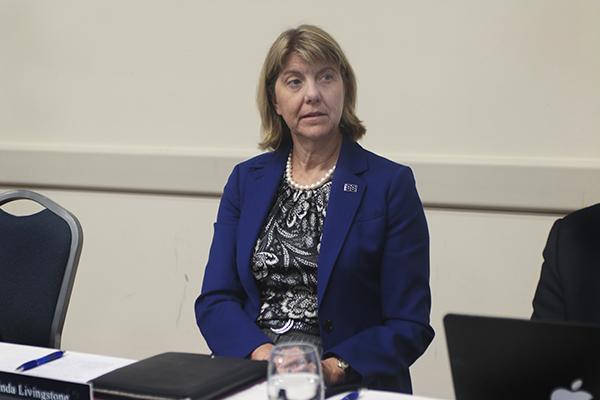Full-time faculty who historically taught master’s of finance courses refused to teach the classes this semester, following the first pay cut in 20 years.
The program is now being taught by mostly adjunct faculty after officials made the cut. The change came after disputes about how the school will share revenue with GW, and how the faculty will be credited for their teaching and research. Officials across the University are trying to drive up enrollment in graduate programs, but professors said a program led by adjunct faculty could lower its quality.
Several professors in the program said they were upset they had not been consulted before the changes were made, claiming that the department is no longer what they had originally designed roughly two decades ago.
Linda Livingstone, the dean of the business school, declined to say how large the pay cut was. She said in an email statement that professors who teach master’s of finance courses were paid “a rate substantially higher than their counterparts” in other master’s programs. She said faculty, who were teaching two-credit courses for the program, were compensated the same amount as faculty who are paid for three-credit courses.
“We have now aligned the credit hours compensated for with the actual number of credit hours taken by students in the MSF program,” Livingstone said. “This alignment matches the MSF faculty compensation with that of our other specialized master’s programs in a reasonable and equitable manner.”
Livingstone also declined to say how many full-time professors are teaching courses, how many adjunct faculty are teaching the courses and the amount professors are paid to teach courses in the program.
She added that all master’s programs in the school use a mix of full-time and adjunct professors to teach all the courses.
“The decisions about which professor teaches which class is left to the department chairs, which have our full confidence in selecting the individuals that provide the best educational experience possible for our students,” she said.
Robert Van Order, the chair of the school’s finance department, said because courses for the master’s of finance degree are taught exclusively on Fridays and Saturdays and are “more technical and time-consuming” for faculty than teaching other courses, the elevated pay is a reasonable incentive to teach the courses.
“From the standpoint of just thinking about the market, from the standpoint of faculty, for the same credits and the same credit hours, it’s easier to teach a core course than to teach an MSF course,” he said. “And so a lot of what’s been the debate over the past few years is how much extra should people get for teaching it.”
He added that the program was originally created to give faculty in the finance department more time and pay to do research – which officials have historically said is key to boost the school’s reputation. But without the original benefits from the program, there’s no motivator for those faculty to participate.
“And the department decided that this wasn’t what it started out to be, and doesn’t want to manage it anymore,” Van Order said. “A bunch of faculty decided that they didn’t want to teach it. So, it’s from that that we had a situation for this year, where there’s still the program, but much of it is taught by adjuncts or people who haven’t taught in it before.”
Adjunct faculty, who are paid per course, are typically paid far less than full-time faculty and the minimum amount depends on details in their union contracts. A tenured faculty member typically earns about $2 million over the course of their time at GW.
The business school took on a substantial financial burden after officials announced the school would have to pay GW $6.5 million over the next seven years to make up for $13 million in overspending.
A professor in the program who spoke on the condition of anonymity because he is still employed by GW, said the master’s of finance program used to offer students a high-quality education, but standards for the program may fall now that mostly adjunct faculty are leading the program.

“Things started out remarkably good, but they were changed without notifying faculty,” said the professor, who stopped teaching the courses after the pay cut.
Another professor, who also used to teach courses in the program and spoke on anonymity because he is still employed by GW, said he refused to teach courses for the program because the “GW administration probably did not fully grasp the unfortunate academic consequences of their attempted interventions.”
“The full-time faculty members who were teaching in this program are top-quality academicians, among the very best that GW has to offer, with extraordinary credentials both as educators and as practitioners,” the professor said. “When administrators start interfering with successful programs developed and fielded by experts such as these, they are playing with fire.”
A second-year student in the program, who also spoke on the condition of anonymity, said students have also noticed a drop-off in the quality of education in the program’s courses. Another student circulated a paper petition to request a meeting with Livingstone, the school’s dean, to ask for more full-time faculty to teach the courses.
Livingstone declined to say whether she met with those students, but said she meets with students regularly and hosts multiple town hall events throughout the year.
The student said because so many students in the program are international, they aren’t aware of the level of quality they should expect in their courses. Ninety-three percent of master’s of finance students are international students, according to the Financial Times.
“Most international students don’t know rights, or what’s going on. Those who do are afraid to talk,” the student said.








